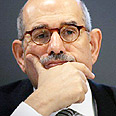
IAEA urges Iran to end nuclear secrecy
International Atomic Energy Agency launches annual meeting, pleads with Tehran to implement transparency measures where nuclear program is concerned. Meeting to focus on Syria, Iran's bid for seat on IAEA board
A six-year probe has not ruled out the possibility that Iran may be running clandestine nuclear programs, the chief UN nuclear inspector said Monday, urging Iran to reassure the world by ending its secretive ways.
Europe also urged Tehran to fully cooperate with a UN probe that is trying to assess all of its past and present nuclear activities.
An EU statement on the opening session Monday at the International Atomic Energy Agency's 145-nation conference declared: "The international community cannot accept the prospect of Iran acquiring nuclear weapons."
In his opening speech, chief UN nuclear inspector Mohamed ElBaradei, the head of the International Atomic Energy Agency (IAEA), focused on Iran's refusal to suspend its uranium enrichment program and alleged past plans to develop the bomb.
The UN Security Council approved a resolution Saturday critical of Tehran's defiance on uranium enrichment, which can create both nuclear fuel and the fissile core of warheads.
Urging Iran to "implement all transparency measures ... required to build confidence in the exclusively peaceful nature of its nuclear program," ElBaradei declared: "This will be good for Iran, good for the Middle East region and good for the world."
He also warned the session that his organization is increasingly stretched in trying to carry out responsibilities that include nonproliferation and preventing terrorists from acquiring the bomb.

The UN Security Council (Archive photo: Reuters)
"All is not well with the IAEA," ElBaradei declared, appealing for greater financial support and more authority for his agency.
Syria, Iran and Israel focus of conference
The conference's proceedings are expected to be dominated by two key issues: The possible candidature of either Syria or Iran for a seat on the IAEA's 35-member board; and Islamic countries' anger over Israel's nuclear weapons.
Israel is widely believed to be the only country in the Middle East to possess nuclear arms, but it refuses to open up its program to international inspections.
In the past two years, Islamic countries have put a resolution urging all Middle East nations to refrain from testing or developing nuclear arms. It urges nuclear weapons states "to refrain from any action" hindering a Middle East nuclear-free zone.
Diplomats said Israel could again force a vote on the Middle East nuclear-free zone resolution unless the second item is withdrawn.
The next key issue looks set to be the candidature of Iran and Syria for a possible seat on the IAEA board, much to the consternation of Western states.
Board members are designated and elected each year by the general conference. A seat is set to become free this year with the expiry of Pakistan's one-year term.
The seat is to be allocated to another country within the so-called Middle East and South Asia (MESA) group. Diplomats close to the IAEA said there are four possible candidates: Iran, Syria, Afghanistan and Kazakhstan.
Iran and Syria's candidacy would almost certainly run into resistance if MESA decided to choose either of them, diplomats said, which could mean a vote would have to be called at the conference, unprecedented in the IAEA's history.
Sources in the UN said that the United States would not be happy if MESA decided to name either Syria or Iran as their candidate for a seat on the board.
AP and AFP contributed to this report










